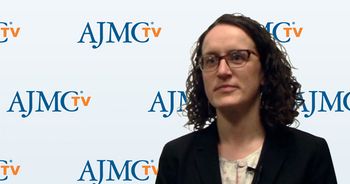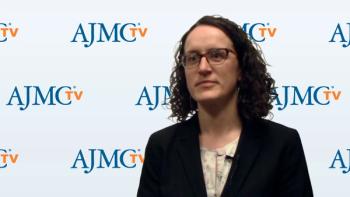
An interdisciplinary approach to patient care is very important because the treatment of gynecologic cancers can be very complex, explained Oliver Dorigo, MD, PhD, associate professor, obstetrics and gynecology, Stanford University Medical Center.

An interdisciplinary approach to patient care is very important because the treatment of gynecologic cancers can be very complex, explained Oliver Dorigo, MD, PhD, associate professor, obstetrics and gynecology, Stanford University Medical Center.

Martha Gaines, MD, JD, LLM, founder and director of The Center for Patient Partnerships, clinical professor of law, University of Wisconsin Law School, explains how The Center for Patient Partnerships helps patients understand their disease, identify their treatment options, and recognize resources available to them.

Sean C. Dowdy, MD, chair, division of gynecologic surgery, department of obstetrics and gynecology, Mayo Clinic, discusses identified factors that cause prolonged delays between discovering an improved treatment or practice and the application of it.

We’ve done a lot of work on quality improvement, such as enhancing recovery, reducing intestinal injury during and after surgery, and reducing infections after surgery, explained William Cliby, MD, consultant, division of gynecologic surgery, department of obstetrics & gynecology, Mayo Clinic.

I think the hardest thing about advanced and recurrent endometrial cancer is that the outcomes are still fairly poor, explained Victoria Bae-Jump, MD, PhD, associate professor, gynecologic oncology, University of North Carolina Lineberger Comprehensive Cancer Center.

We have a number of biomarkers that we have shown are associated with a better response to certain new therapies, said Oliver Dorigo, MD, PhD, associate professor, obstetrics and gynecology, Stanford University Medical Center.

Martha Gaines, MD, JD, LLM, founder and director of The Center for Patient Partnerships, clinical professor of law, University of Wisconsin Law School, explains how she turned her experience as a cancer survivor into a model for consumer-centered patient advocacy.

Early feeding, euvalemia, and multimodal pain management can be used to to accelerate surgical recovery and improve outcomes in gynecologic oncology, explained Sean C. Dowdy, MD, chair, division of gynecologic surgery, department of obstetrics and gynecology, Mayo Clinic.

William Cliby, MD, consultant, division of gynecologic surgery, department of obstetrics & gynecology, Mayo Clinic, discusses patient factors that predispose them to adverse complications during surgery for ovarian cancer and using those predictors to improve care.

If we don't close the gap in gender differences in HPV vaccination, we will likely see an increase in HPV-related cancers, explained Anna Beavis, MD, MPH, a gynecologic oncologist fellow at Johns Hopkins University.

Our division at Stanford is very interested in investigating innovative therapies and has a particular focus on immunotherapies, explained Oliver Dorigo, MD, PhD, associate professor, obstetrics and gynecology, Stanford University Medical Center.

Victoria Bae-Jump, MD, PhD, associate professor, gynecologic oncology, University of North Carolina Lineberger Comprehensive Cancer Center, discusses the current standard of treatment for patients with advanced endometrial cancer as well as the role novel therapies, such as targeted therapies and immunotherapy, play in the treatment of the disease.

It’s important to emphasize that this is not an opioid crisis, it’s a prescription opioid crisis, said Sean C. Dowdy, MD, chair, division of gynecologic surgery, department of obstetrics and gynecology, Mayo Clinic.

At the Society of Gynecologic Oncology’s 2018 Annual Meeting on Women’s Cancer, 1 abstract found Patient-Centered Oncology Payment model would yield savings if hospitalizations were reduced, while another abstract piloted a scoring system for financial toxicity in gynecological cancers.

The lead researcher said the study could lead to women being given a statin as soon as they are diagnosed with endometrial cancer.

Oliver Dorigo, MD, PhD, associate professor, obstetrics and gynecology, Stanford University Medical Center, discusses the use of PARP inhibitors and immunotherapy in gynecologic cancers.

William Cliby, MD, consultant, division of gynecologic surgery, department of obstetrics & gynecology, Mayo Clinic, discusses predictors of overall outcomes and survival in patients with ovarian cancer.

Much about using PARP inhibitors is open to debate, starting with what kind of genetic test to give before using them. Combination therapies are the next frontier, according to an expert panel.

One in 5 parents of boys said the main reason that they haven’t vaccinated their sons for HPV was because they didn’t receive a recommendation for the vaccination, compared with 1 in 10 girls, said Anna Beavis, MD, MPH, a gynecologic oncologist fellow at Johns Hopkins University.

Approximately 60% of patients with endometrial cancer are obese, explained Victoria Bae-Jump, MD, PhD, associate professor, gynecologic oncology, University of North Carolina Lineberger Comprehensive Cancer Center.

Uptake for the human papillomavirus (HPV) vaccination has never reached CDC targets. Minority children from lower-income households are more likely to get the vaccination than white children from higher-income households, according to the study author.

An educational session helps oncologists understand the decision-making process for selecting treatments for recurrent ovarian cancer.

Having healthcare professionals with different sets of experiences or different training can help create better solutions and improve patient outcomes, explained Scott Page, PhD, the Leonid Hurwicz Collegiate Professor of Complex Systems, Political Science, and Economics at the University of Michigan.

Clinical trials, and offering patients support to take part in them, can extend lives of patients with ovarian cancer, according to a researcher from the Medical College of Georgia. But another analysis finds that gynecologial cancers are low on the government's funding priority list.

When making changes in healthcare, the patient’s voice is rarely at the table, said Martha Gaines, MD, JD, LLM, founder and director of The Center for Patient Partnerships, clinical professor of law, University of Wisconsin Law School.

259 Prospect Plains Rd, Bldg H
Cranbury, NJ 08512
© 2025 MJH Life Sciences®
All rights reserved.
